外研版高中英语选修八Module1 Deep South-Corner课件(27张PPT)
文档属性
| 名称 | 外研版高中英语选修八Module1 Deep South-Corner课件(27张PPT) |

|
|
| 格式 | zip | ||
| 文件大小 | 2.9MB | ||
| 资源类型 | 教案 | ||
| 版本资源 | 外研版 | ||
| 科目 | 英语 | ||
| 更新时间 | 2022-03-09 08:52:54 | ||
图片预览

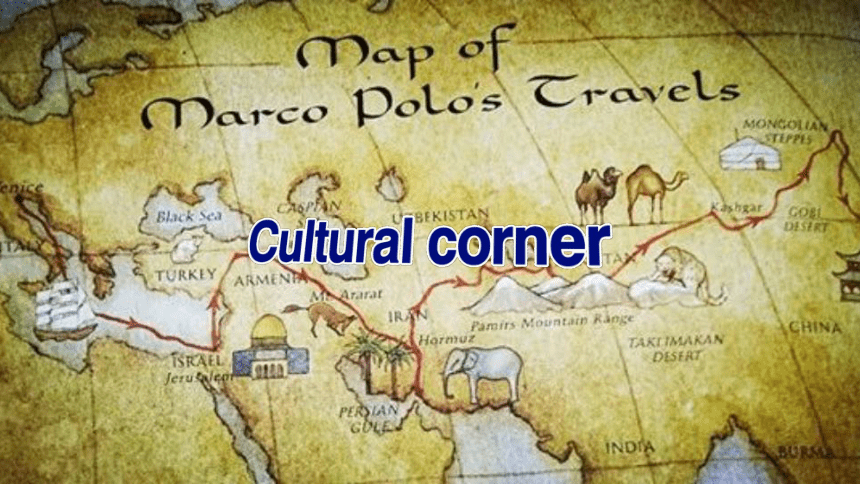

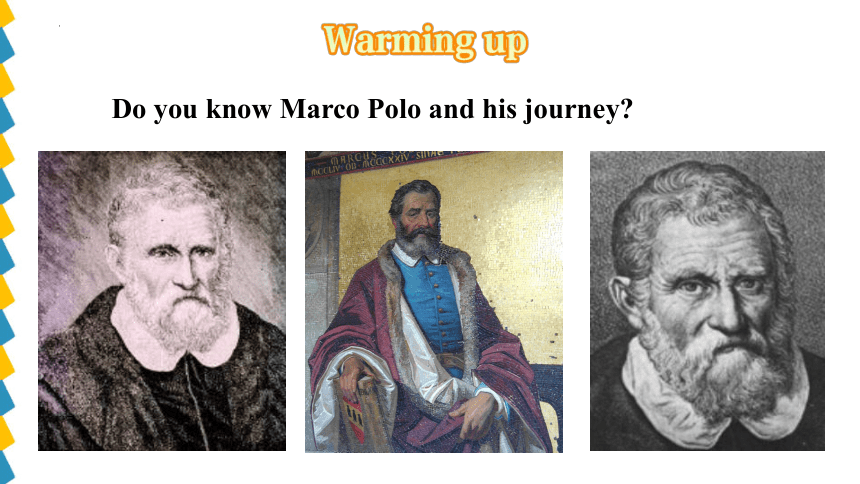
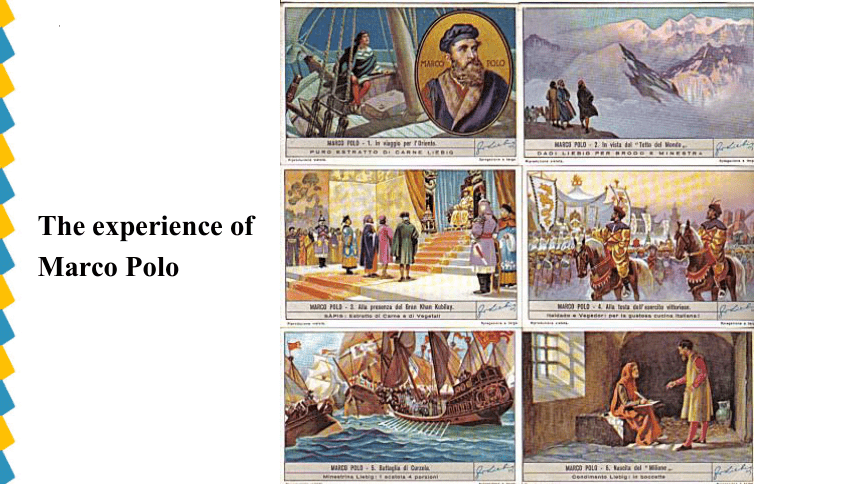
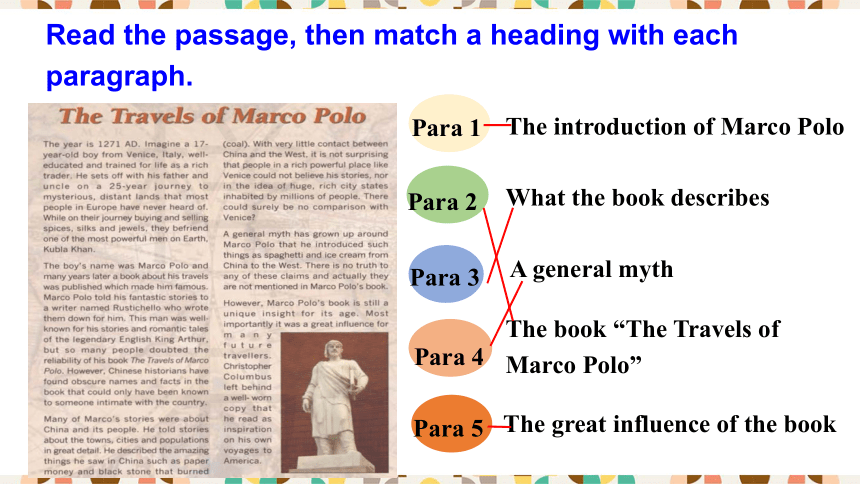


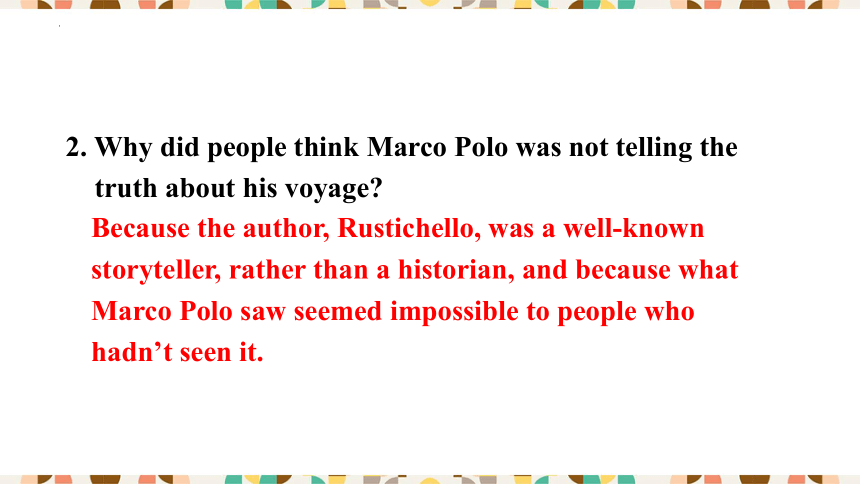
文档简介
(共27张PPT)
Module 1
Deep South
To learn the travel of Marco Polo.
To leanr some useful expressions.
Do you know Marco Polo and his journey
The experience of Marco Polo
Para 1
Para 2
Para 3
Para 4
Para 5
A general myth
What the book describes
The great influence of the book
The introduction of Marco Polo
The book “The Travels of Marco Polo”
Read the passage, then match a heading with each paragraph.
1.When did Marco begin his journey
2.Who were on the journey with him
3.Who became their friend
4. Infer what kind of places Marco Polo has travelled
1271 AD
His father and uncle
Kubla Khan
China (Yuan Dynasty)
Read the paragraph 1 and answer the questions.
Read the paragraph 2-4 and answer the questions.
1. What is the dispute about the book List the different
opinions. (many people vs. Chinese historians)
Many people doubted the reliability of the book, but Chinese historians have found obscure names and facts in the book that could only have been known to someone intimate with the country.
2. Why did people think Marco Polo was not telling the
truth about his voyage
Because the author, Rustichello, was a well-known storyteller, rather than a historian, and because what Marco Polo saw seemed impossible to people who hadn’t seen it.
Read the paragraph 5 and answer the questions.
1. What’s the significance of the book
2. Can you give us an example of its influence Translate it
into Chinese
It is still a unique insight for its age as well as the inspiration for future travellers.
Christopher Columbus left behind a well-worn copy that he read as inspiration on his own voyages to America.
哥伦布留下了一本翻破了的书,在去美洲的途中他通过阅读这本书获得精神上的鼓舞。
Read the passage again and answer the questions.
Why did people think Marco Polo was not telling the truth about his voyage
Because the author, Rustichello, was a well-known storyteller, rather than a historian, and because what Marco Polo saw seemed impossible to people who hadn’t seen it.
Do you believe that Marco Polo did visit China
Doubts:
Trusts:
Evidence the Chinese historians proved is reliable.
It is too exaggerated because:
1) Rustichello, was a well-known storyteller, rather than a
historian.
2) what Marco Polo saw seemed impossible to people who
hadn’t seen it.
Read the text carefully and decide the sentences True or False.
1. Marco Polo sets off alone on a 25-year journey to China. ( )
2. The book about Marco Polo’s travels was written by Marco Polo. ( )
3. The book described the amazing things in China such as paper money and coal. ( )
4. Marco Polo’s book was a great influence for many future travelers. ( )
F
F
T
T
Fill in the blanks according to the passage.
The Travels of Marco Polo is a book about Marco Polo’s travels with his father and uncle from 1. ______ in Italy to mysterious, distant lands unknown to most people in Europe. In the book Marco Polo tells many fantastic stories, many of which are about 2. __________________. He describes the amazing things he saw in China such as paper money and coal.
Venice
China and its people
This book is still a unique 3. ________ for its age and most importantly it was a great influence for many future 4. ________ like Christopher Columbus.
travellers
insight
1. He sets off with his father and uncle on a 25-year journey to mysterious, distant lands that most people in Europe have never heard of.
他跟随父亲和叔叔进行了一次长达25年的旅行,游历了大多数欧洲人闻所未闻的神秘而遥远的地方。
set off是短语动词,主要含义和用法有:
1) 出发,动身
e.g. Can you tell me what time they set off this morning
你能告诉我他们今天早上几点出发吗?
2) 燃放(鞭炮等),使……爆炸
e.g. The children were setting off fireworks in the yard.
孩子们在院子里放焰火。
3) 引发,激发
e.g. What he said on TV set off the public’s anger.
他在电视上说的话激起了公众的愤怒。
4) set sb. off doing sth.引起(做某事)使某人开
始做某事
e.g. That set all of us off laughing again.
这又让我们大笑了起来。
【拓展】
set about doing sth. 开始/着手做某事
set...free 释放;解放
set aside 搁置,保留,抽出(时间、金钱)
set by 把……搁在一旁;把……留作将来之用
set out 出发,开始;陈述
set up 竖起;建起,安装,设立
be set in 以……为背景
set down 记下,写下
【语境应用】用含set的短语的正确形式填空。
1) If you want to catch that train we’d better
________ for the station immediately.
2) My brother was good at ___________ his
thoughts on paper.
3) A workman carrying out repairs ________ the
fire alarm unexpectedly.
4) They want to ________ a special school to help
disabled children.
set off
setting down
set off
set up
2. He told stories about the towns, cities and populations in great detail.
他详尽地讲述了关于那些乡镇、城市和居民的故事。
in detail 详细地
e.g. Our teacher told us in detail what we would be
expected to do during the visit.
老师详细地跟我们说明了在访问期间应该做的事情。
3. Christopher Columbus left behind a well-worn copy that he read as inspiration on his own voyages to America.
克里斯托弗·哥伦布留下了一本翻破了的书,在去美洲途中他通过阅读这本书获取了精神上的鼓舞。
leave behind 遗留, 留下
e.g. Her husband died, leaving behind nothing but debts.
她丈夫死了, 除了债务什么也没留下。
【拓展】
left behind 没带,忘带 ;把……抛在后面,超过
e.g. In class, children who are not focused will soon be left
behind.
在课堂上,注意力不集中的孩子很快就会被落在后面。
I’ve left my coat behind in the bus.
我把外套落在公交车上了。
其它含leave的常用短语:
leave ... about(东西)乱扔;
leave ... alone 不管,让……一个待着;leave ... aside 搁置;
leave for 动身到(某处);
leave off 停止,脱掉,不穿;
leave out 漏掉,删掉。
【语境应用】用适当的介词或副词填空。
1) Lucy always leaves her pens and books_____ when doing
her homework.
2) Leaving the expense _____, do we actually need a second
car
3) In copying this paper, be careful not to leave ____ any
words.
4) The little girl left ____ crying, and dried her eyes with
her sleeve.
about
aside
out
off
1. Find out more about Marco Polo’s voyage. Use other sources, such as history books and the Internet.
2. Find out another heroic journey, get more information and make notes about the jouney. Then use your notes to write an account of the journey.
Module 1
Deep South
To learn the travel of Marco Polo.
To leanr some useful expressions.
Do you know Marco Polo and his journey
The experience of Marco Polo
Para 1
Para 2
Para 3
Para 4
Para 5
A general myth
What the book describes
The great influence of the book
The introduction of Marco Polo
The book “The Travels of Marco Polo”
Read the passage, then match a heading with each paragraph.
1.When did Marco begin his journey
2.Who were on the journey with him
3.Who became their friend
4. Infer what kind of places Marco Polo has travelled
1271 AD
His father and uncle
Kubla Khan
China (Yuan Dynasty)
Read the paragraph 1 and answer the questions.
Read the paragraph 2-4 and answer the questions.
1. What is the dispute about the book List the different
opinions. (many people vs. Chinese historians)
Many people doubted the reliability of the book, but Chinese historians have found obscure names and facts in the book that could only have been known to someone intimate with the country.
2. Why did people think Marco Polo was not telling the
truth about his voyage
Because the author, Rustichello, was a well-known storyteller, rather than a historian, and because what Marco Polo saw seemed impossible to people who hadn’t seen it.
Read the paragraph 5 and answer the questions.
1. What’s the significance of the book
2. Can you give us an example of its influence Translate it
into Chinese
It is still a unique insight for its age as well as the inspiration for future travellers.
Christopher Columbus left behind a well-worn copy that he read as inspiration on his own voyages to America.
哥伦布留下了一本翻破了的书,在去美洲的途中他通过阅读这本书获得精神上的鼓舞。
Read the passage again and answer the questions.
Why did people think Marco Polo was not telling the truth about his voyage
Because the author, Rustichello, was a well-known storyteller, rather than a historian, and because what Marco Polo saw seemed impossible to people who hadn’t seen it.
Do you believe that Marco Polo did visit China
Doubts:
Trusts:
Evidence the Chinese historians proved is reliable.
It is too exaggerated because:
1) Rustichello, was a well-known storyteller, rather than a
historian.
2) what Marco Polo saw seemed impossible to people who
hadn’t seen it.
Read the text carefully and decide the sentences True or False.
1. Marco Polo sets off alone on a 25-year journey to China. ( )
2. The book about Marco Polo’s travels was written by Marco Polo. ( )
3. The book described the amazing things in China such as paper money and coal. ( )
4. Marco Polo’s book was a great influence for many future travelers. ( )
F
F
T
T
Fill in the blanks according to the passage.
The Travels of Marco Polo is a book about Marco Polo’s travels with his father and uncle from 1. ______ in Italy to mysterious, distant lands unknown to most people in Europe. In the book Marco Polo tells many fantastic stories, many of which are about 2. __________________. He describes the amazing things he saw in China such as paper money and coal.
Venice
China and its people
This book is still a unique 3. ________ for its age and most importantly it was a great influence for many future 4. ________ like Christopher Columbus.
travellers
insight
1. He sets off with his father and uncle on a 25-year journey to mysterious, distant lands that most people in Europe have never heard of.
他跟随父亲和叔叔进行了一次长达25年的旅行,游历了大多数欧洲人闻所未闻的神秘而遥远的地方。
set off是短语动词,主要含义和用法有:
1) 出发,动身
e.g. Can you tell me what time they set off this morning
你能告诉我他们今天早上几点出发吗?
2) 燃放(鞭炮等),使……爆炸
e.g. The children were setting off fireworks in the yard.
孩子们在院子里放焰火。
3) 引发,激发
e.g. What he said on TV set off the public’s anger.
他在电视上说的话激起了公众的愤怒。
4) set sb. off doing sth.引起(做某事)使某人开
始做某事
e.g. That set all of us off laughing again.
这又让我们大笑了起来。
【拓展】
set about doing sth. 开始/着手做某事
set...free 释放;解放
set aside 搁置,保留,抽出(时间、金钱)
set by 把……搁在一旁;把……留作将来之用
set out 出发,开始;陈述
set up 竖起;建起,安装,设立
be set in 以……为背景
set down 记下,写下
【语境应用】用含set的短语的正确形式填空。
1) If you want to catch that train we’d better
________ for the station immediately.
2) My brother was good at ___________ his
thoughts on paper.
3) A workman carrying out repairs ________ the
fire alarm unexpectedly.
4) They want to ________ a special school to help
disabled children.
set off
setting down
set off
set up
2. He told stories about the towns, cities and populations in great detail.
他详尽地讲述了关于那些乡镇、城市和居民的故事。
in detail 详细地
e.g. Our teacher told us in detail what we would be
expected to do during the visit.
老师详细地跟我们说明了在访问期间应该做的事情。
3. Christopher Columbus left behind a well-worn copy that he read as inspiration on his own voyages to America.
克里斯托弗·哥伦布留下了一本翻破了的书,在去美洲途中他通过阅读这本书获取了精神上的鼓舞。
leave behind 遗留, 留下
e.g. Her husband died, leaving behind nothing but debts.
她丈夫死了, 除了债务什么也没留下。
【拓展】
left behind 没带,忘带 ;把……抛在后面,超过
e.g. In class, children who are not focused will soon be left
behind.
在课堂上,注意力不集中的孩子很快就会被落在后面。
I’ve left my coat behind in the bus.
我把外套落在公交车上了。
其它含leave的常用短语:
leave ... about(东西)乱扔;
leave ... alone 不管,让……一个待着;leave ... aside 搁置;
leave for 动身到(某处);
leave off 停止,脱掉,不穿;
leave out 漏掉,删掉。
【语境应用】用适当的介词或副词填空。
1) Lucy always leaves her pens and books_____ when doing
her homework.
2) Leaving the expense _____, do we actually need a second
car
3) In copying this paper, be careful not to leave ____ any
words.
4) The little girl left ____ crying, and dried her eyes with
her sleeve.
about
aside
out
off
1. Find out more about Marco Polo’s voyage. Use other sources, such as history books and the Internet.
2. Find out another heroic journey, get more information and make notes about the jouney. Then use your notes to write an account of the journey.
